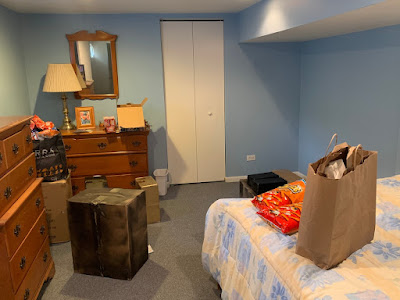When you give a luncheon or dinner, do not invite your friends, your brothers or sisters, your relatives, or your rich neighbors; if you do, they may invite you back and so you will be repaid. But when you give a banquet, invite the poor, the crippled, the lame, the blind, and you will be blessed. Although they cannot repay you, you will be repaid at the resurrection of the righteous.”
-Luke 14:12-14 (NIV)
My son is the digital marketing and social media guy for our church. This week, he posted this photo and these words: “We can't fit too many more VBS supplies in [our] basement...Thankfully, VBS begins in less than two weeks….”
VBS, in case you’re not aware, is an acronym for Vacation Bible School. It’s a way churches often reach out in the summer, when kids are on vacation from school, to offer fun and Bible learning. We’ve done it in different ways in our church the last few years, but we always try to make it as fun and exciting as we can for the kids. We want them to get excited about it. We want them to bring their friends. We want them to get used to the idea that there’s stuff happening at church for them, that they have a place there. That they matter to us.
A basement room filled with VBS supplies, props, and curriculum is hopefully a sign that kids do have a place at church. We try to demonstrate that in other ways, too. Go upstairs in our church building, and you’ll find classrooms that our teachers have decorated, filled with appropriately-sized furniture, kids’ Bibles, supplies, games, and snacks. That’s not unusual, of course — most churches have kids’ classrooms. But those spaces set aside and specially adapted for kids tell anyone who might see them that we’re serious about kids learning about Jesus.
Josh’s post got me thinking: What do we make room for at church?
A few things came to mind immediately. We have a large room that dominates our building. It’s more elaborately decorated than the rest of the building. It has a sound system in it. It’s where we come together on Sundays to worship, and all anyone has to do to see how we value Sunday worship is walk through our building and note how much of it the worship space takes up.
We have a room called the “multi-purpose room.” Most Sundays we use it for a classroom. A lot of the time we use it for a meeting room. Often, we use it as a place to eat together. It’s been used for wedding receptions and funeral lunches. Sometimes community organizations meet there. Sometimes we use it for our food pantry. I think that means we want to be flexible, to use our building in ways that meet needs — both our own and in our community.
Speaking of our food pantry, we have a room set up with freezers and cabinets for food storage — we literally make room for feeding food-insecure people. We have a tank of water and changing rooms for baptizing. There’s an office. We have a room with a video monitor of our worship service where parents of small children can go if the kids are having trouble sitting quietly. Here’s my point: one way to tell what any church really values is to walk through the building and see what we’ve made room for. If we say something is important to us, but you don’t see any space for it — well, you might reasonably ask how much it really matters. The physical space given to something can be an indicator of how much we care about it.
But there's a related, though not necessarily identical question it’s important for a church to ask: Who do we make room for at church?
Sometimes you can tell that from the building as well. All of the spaces in a church building have something to say about people included or excluded. Quite a few years ago now, for instance, we put in a lift and a wheelchair-accessible restroom so people with limited mobility don’t have to negotiate the many stairs and other obstacles in our vertically-designed building. A recent Washington Post story describes churches in different parts of the country developing underutilized property into affordable housing — a church making room for people who need housing speaks considerably to what matters to them.
Of course, a church doesn’t have to have a building. That can say a lot about what matters to that church as well, right? I read about one church that sold its building so that a 173-unit affordable housing complex can be built on the site, and then rented space in the new complex for worship. When you make so much room for others that you actually move out yourself — well, that’s a pretty significant commitment. And, incidentally, a very Christian thing to do.
Who do we make room for at church, and how? I know about a church that has a Vacation Bible School every summer for intellectually disabled kids, organized and led by people who best know how to connect with them. I know of churches with ministries on college campuses giving students a family and a place to go for support, encouragement, and spiritual growth. I know churches who intentionally work to make themselves a safe place for people who are questioning and searching, or who open their doors for support groups for people in recovery or survivors of abuse or parents who have lost children.
I think you’d want to be careful about inviting Jesus to dinner; apparently he wasn’t shy about telling his hosts who ought to be there. Once, Jesus told his host not to put friends, family, and influential people on the guest list next time. Instead, he said, “invite the poor, the crippled, the lame, the blind.” I don’t think his point was that only those four categories of people could come to dinner, or that you should never invite the in-laws over. I think he was warning us to guard against the tendency we have to see the world too narrowly and never reach out with love and kindness beyond the people who are like us, or the people we want to be like.
A few years ago, before COVID, we were having a meal together at church, and this text really came alive for me. Folks started coming in to wait for our food pantry to open, and I was struck with the uncomfortable irony of all of us sitting around tables with plates full of food, enjoying each others’ company, while our food pantry clients looked on. Thankfully, a few members invited them to join us at the table, which led to pantry clients being invited to future meals.
Who does your church make room for, and how? Do people of color feel there’s room for them? Immigrants? In a post-COVID world, do you make room for people with compromised immune systems, who might need special accommodation or maybe even don’t feel they can come to the building? Do people feel they have to embrace a particular political viewpoint to find a place? Do the poor, who can’t give much financially, have room at your church, or do they hear that you value more those who can give a lot? Do you make room for people who are struggling under the guilt of a failed marriage? Do you make room for people who are attracted to the same sex and wonder if there’s still a place in the gospel story for them?
No church does it all, I know. All of us are in progress. The point is not to feel guilty about past oversights, but to let Jesus remind us not to be content with just making room for other people like us.
There’s plenty of room, you’ll find it. And, as Jesus promises, you’ll be blessed because of it.



